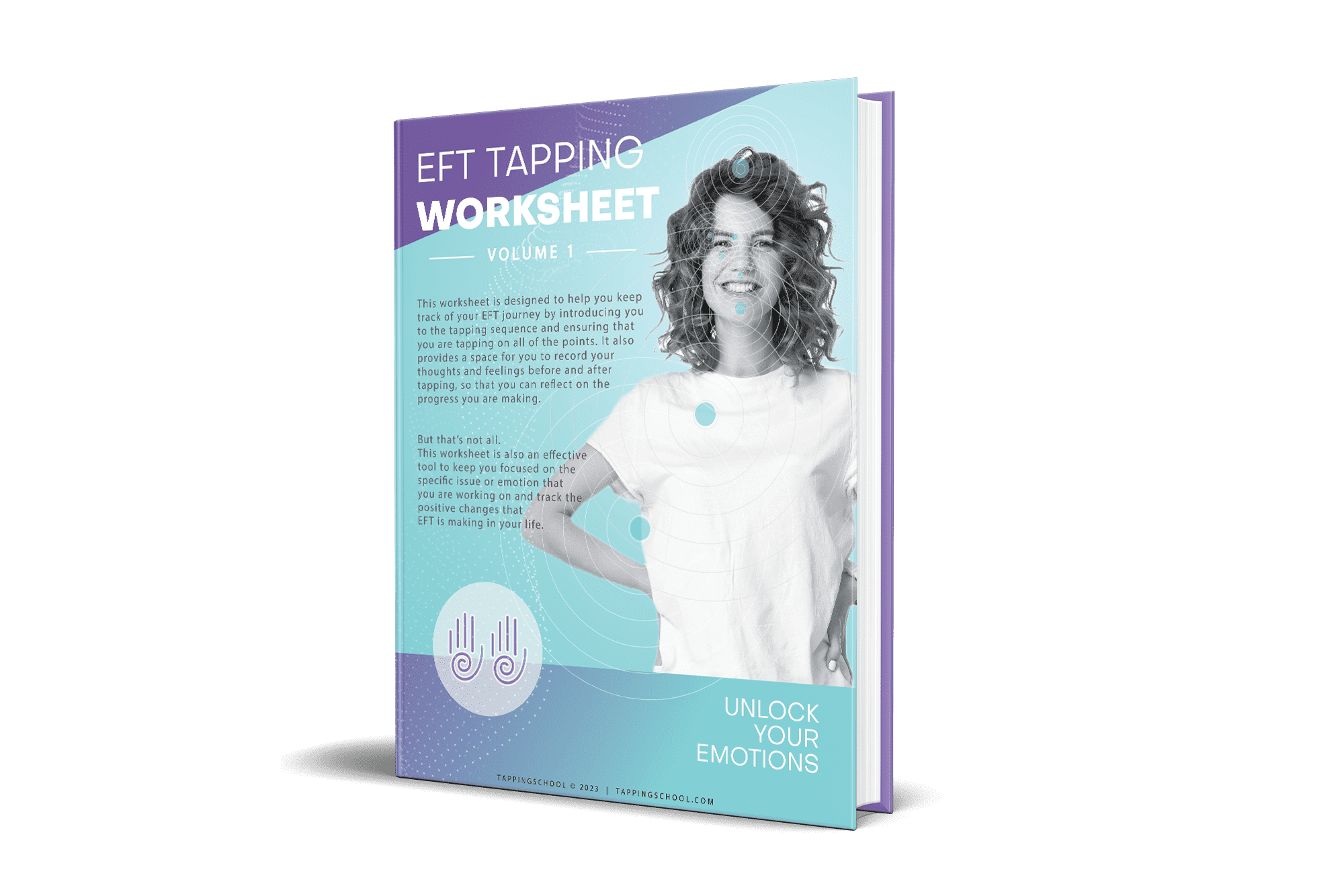Learn the facts about EFT tapping
Not everyone is familiar with EFT tapping or the science behind it. This results in misinformation about the technique, leading to some people wondering why tapping should be avoided.
EFT is an evidence-based and effective technique, and if it is done correctly, there are few to no side effects or risks associated with EFT tapping. This sets EFT tapping apart from other methods used in the mental health field. Even better, EFT tapping can help with a wide range of mental health concerns.
So, what exactly is EFT tapping? Why do some say that tapping should be avoided, and what does research reveal to combat that myth? In this article, we will answer those questions and explore:
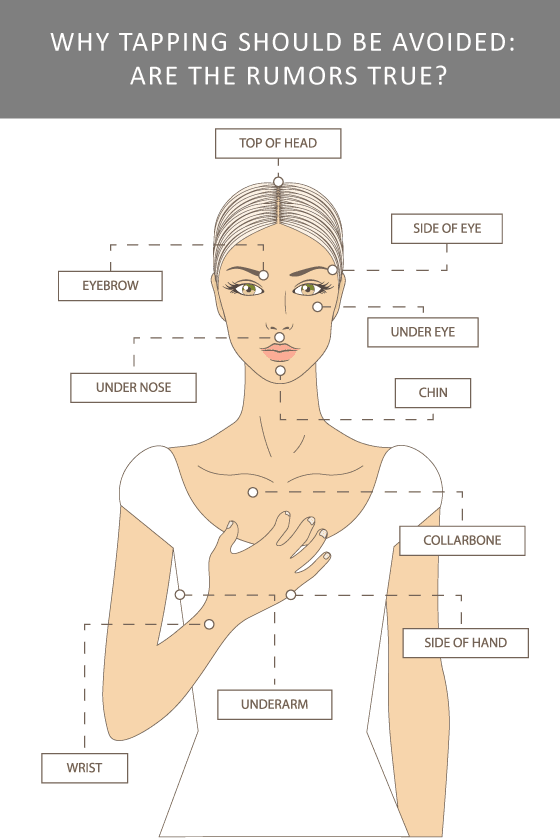
What Is EFT Tapping?
First, what is EFT tapping? The Emotional Freedom Technique (EFT) combines elements of cognitive and exposure therapies with acupressure via tapping to combat psychological distress. The technique was founded by Gary Craig in the 1990s. However, its roots date back even further to the 1970s. Similar to acupuncture, tapping is contingent on the idea that the body’s energy travels through specific pathways. However, instead of using needles, you stimulate said pathways through physical touch.
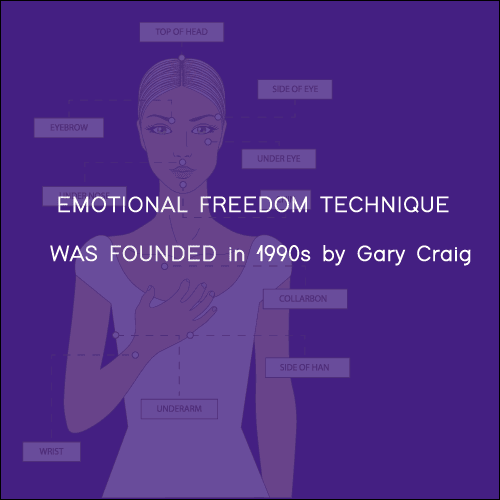
EFT tapping works because it helps an individual soothe their central nervous system. It is important to learn to soothe the central nervous system through techniques like EFT because, when our central nervous system is overly activated, it can lead to heightened physical and mental health problems. These problems are due largely to a spike in stress hormones, which emotional freedom techniques like tapping can reduce.
EFT is considered a body-focused form of therapy. It helps to relieve emotional pain and stress while emphasizing the well-known connection between the mind and the body. In other words, it addresses your full self rather than isolating the body from the mind.
“The link between our minds and bodies holds a well of potential when it comes to radical healing. Even mainstream medicine accepts that our stress levels and thought patterns, for example, can impact our physical health.”
Jeffrey Rediger
Why Should EFT Tapping Be Avoided?
If you look up why EFT tapping should be avoided, you will see false claims, such as that it is not backed by science, that it can be physically painful, that the results are a placebo effect, or that it doesn’t address mental health problems long-term.
First and foremost, EFT is backed by extensive clinical research. EFT is considered an evidence-based form of treatment, and many studies show that it is effective. If EFT tapping is physically painful in any capacity, soft tapping is anecdotal. Tapping should never hurt a client, whether it is conducted independently or with an EFT practitioner.

Furthermore, during an EFT tapping session, you address what’s bothering you head-on, whether that’s stress and anxiety, panic attacks, intrusive thoughts, or painful memories. It’s something that you can tailor to your own experiences, which sets it apart from other interventions and may be part of why so much of the research on EFT shows that it has long-term positive effects.
It is true that EFT is new in comparison to some other therapies. However, this is true for many forms of treatment. Many new treatments like EFT are changing the course of mental health care, providing safer and more effective options for people who are struggling.
- While no form of treatment works for everyone, EFT should not be avoided. Instead, if it can help a client, EFT should be considered as an option.
Now, let’s talk about what the research says about EFT and the mental health concerns it can help with.
What Can EFT Tapping Help With?
Research suggests that EFT tapping can help with a range of conditions and concerns. While this is by no means an extensive list, and individuals can utilize EFT tapping for other purposes, it is known that EFT tapping can help individuals experiencing the following issues find relief.

a. Anxiety
EFT tapping can help with various anxiety disorders and related concerns, including panic attacks, specific phobias, generalized anxiety disorder, and more. A meta-analysis of fourteen studies conducted on EFT found that EFT leads to a decline in anxiety scores.
b. Anger
Angry outbursts can be symptomatic of mental health conditions and is not an uncommon struggle. Since EFT tapping soothes the nervous system and helps you better cope with thoughts and manage behaviors, it can be helpful for those who face concerns related to anger. A study on university students, one group of which tried EFT and another group of which engaged in mindful breathing, found the EFT group reported more significant increases in hope, enjoyment, and pride and more significant decreases in anger, anxiety, and shame.


c. Depression
A systematic review and meta-analysis of twenty different studies on the emotional freedom technique as a treatment for depression found that it is effective in reducing depression scores. Some of the research shows that EFT is more effective as a treatment for depression than other, more common forms of care.
d. Stress
EFT tapping is ideal for those who find that stress negatively impacts their life and well-being. Research reveals that EFT lowers both physical and mental or psychological markers of stress. EFT tapping can even help promote restful sleep, which is often disrupted by stress but is crucial for managing one’s health.

e. PTSD
EFT for post-traumatic stress disorder (PTSD) is shown to be effective in four to ten sessions. It can help people who have survived many different traumatic events find relief and lessen symptoms that disrupt their life. Also relevant, some research indicates that it comes with better outcomes than both pharmacological interventions and traditional psychotherapy for PTSD.
It is even shown that EFT tapping can improve physiological health markers and reduce physical pain. Furthermore, the positive effects of EFT tapping appear to last in many cases, which gives it a hand up in comparison to some other treatment options. So, to say that EFT is not backed by science is far from the truth.
That said, it’s important to understand how to make EFT work for you and how to find a reliable EFT practitioner so that you can engage in EFT safely and get the best results.
How To Make EFT Tapping Work For You
For those who want to learn and use EFT tapping as a self-help method, there is good news. If you’re just getting started, you can find eft tapping scripts online and instructional videos that help you learn EFT tapping. Even better, you can find tapping scripts and videos catered to specific mental health challenges. For example, if you search for “EFT obsessive thought scripts” or “emotional freedom technique EFT tapping anxiety,” you will likely find an online video or guide that takes you through a tapping sequence.
Although it can be helpful to use online videos to gain a better understanding of what EFT tapping looks like at the beginning of your journey with EFT, there are times when working with an EFT practitioner is best. It is also necessary to be mindful of how you practice EFT on your own.
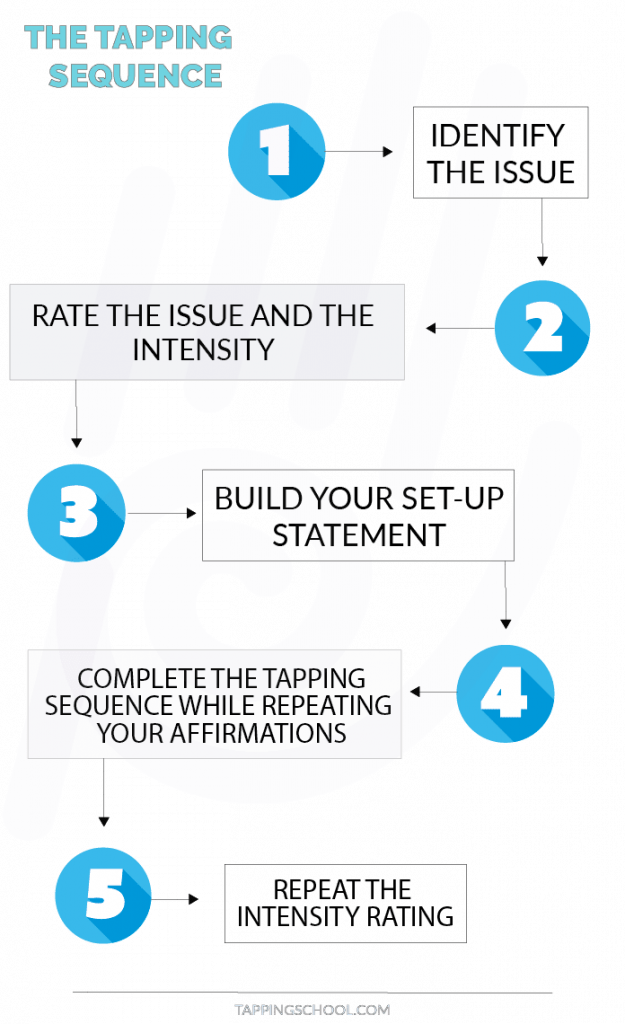
Specifically, you want to make sure that you are focusing on your needs during a tapping session rather than someone else’s. If you use online guides and don’t tailor the words you say or what you focus on during a session to yourself, you might start tuning into the words and experiences of another person. Instead, it is best to get introspective.
If you take nothing else from this, remember this tip: Even if you use videos on EFT tapping as a guide, you must adjust what you speak and think about as you tap to your own experience.
Tapping works best when you start to ask yourself specific questions. For example, perhaps your family member said something to you when you were younger that hurt your feelings. It sticks with you to this day. When you think about it now, how does their statement make you feel? If you are using tapping for stress, what are you stressed out about? What thoughts are you having? Can you verbalize them out loud as you tap?
This is an example of the way you might coach yourself through a tapping session. That said, it is best to find an EFT practitioner you can trust. That way, not only will you have the support and guidance of the professional, but you also can learn from the way they use tapping in sessions. With this knowledge, you can use EFT tapping at home confidently, even long after you stop working with a provider.
As stated earlier, many people notice the positive effects of EFT quickly. One of the best parts of seeing an EFT practitioner is that you can use what you learn from the sessions to help yourself long-term.
What Is An EFT Tapping Session Like?
If you’re interested in using emotional freedom techniques and want to learn EFT tapping, you may wonder what a tapping sequence is typically like. Here is an example of how tapping works and what you will do during a sequence:
- First, talk about the problem you want to address. Rate your level of distress surrounding the topic on a scale of 0 to 10.
- Second, make a statement out loud that identifies the problem at hand and frames the problem through a lens of radical acceptance. For example, “I don’t feel good about how I look right now, and that is okay.”
- Start the tapping sequence. Make sure to tap on the acupressure points or meridian points. Learning exactly how to tap and where these points are is part of why it’s often so crucial to learn from an EFT practitioner.
- Continue speaking as you tap the meridian points. Use a reminder phrase so that you stay focused on the proper area.
- Rate your distress at the end of your tapping sequence. Continue until your distress rating is low. If you’re distress rating lessens, you will have engaged in a successful tapping sequence.
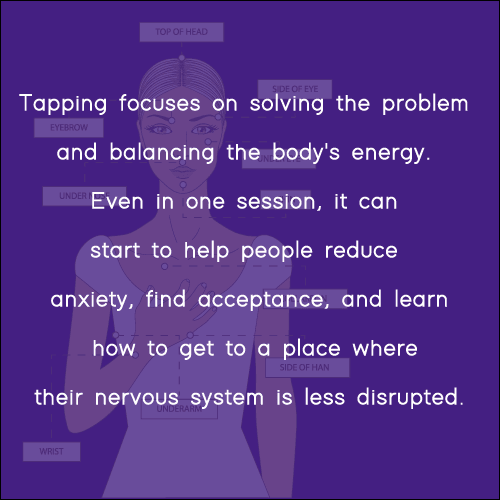
Tapping focuses on solving the problem and balancing the body’s energy. Even in one session, it can start to help people reduce anxiety, find acceptance, and learn how to get to a place where their nervous system is less disrupted.
Attributes Of A Great EFT Practitioner
To help you stay safe and feel confident in your practice, you want to find the best EFT practitioner. Here are some attributes of a great EFT practitioner to look for:
- You feel at ease with the practitioner and trust them with your story. For you to get the best results from EFT tapping, it is crucial to have a sense of trust with your EFT practitioner. Pick a practitioner you feel at ease with, and don’t hesitate to shop around a bit before you decide who you’ll work with.
- They’re a good listener and don’t impose their own words during tapping sessions. The practitioner should listen to what you say about yourself and your story. Rather than imposing their own words, they should guide you to choose your own and encourage you to trust yourself.
- The practitioner is non-judgmental. For you to be comfortable and make progress, your practitioner can’t be judgmental. They should be open-minded and warm.
- They observe everything intently. An EFT practitioner needs to be observant. That way, they can help you through a session effectively and aid you in moving past any points where you feel stuck or unsure.
- The practitioner focuses on the client rather than themselves. Your practitioner should focus on you, your needs, your goals, and your story. They should not spend the majority of your sessions talking about themselves.
- They have strong boundaries and communication skills. Every good practitioner will have firm boundaries and will communicate with clients appropriately. They should remain professional, and their role as a provider should be clear.
- The practitioner doesn’t make you dependent on them. A practitioner shouldn’t let you become dependent on them. Instead, they should teach you skills and techniques to use on your own and set you up for long-term success with the EFT tapping technique.
- They’re empathetic toward clients. Any good practitioner will have empathy. They will remain patient and caring throughout sessions.
- They make notes of previous sessions and know the realistic goals of EFT tapping therapy. Practitioners should take note of what you say so that they remember and can help you the most during your sessions. They should help you set and meet realistic goals through EFT tapping therapy.

Learning from an EFT practitioner is valuable long-term because you can transfer the skills to your self-help tapping practice. An EFT practitioner gives you a safe space to dive deep into your feelings and can help you formulate effective tapping scripts catered to you so that you can avoid the aforementioned considerations and fears, such as lack of efficacy or tapping too hard.
Final Thoughts
EFT tapping is an evidence-based form of treatment for a range of mental health concerns. It can also help those coping with physical pain and other problems. There are myths surrounding EFT, such as that it doesn’t work. However, scientific evidence proves that this is false, as EFT tapping is known to help relieve emotional pain and stress and can even promote physical health.
So, as for why tapping should be avoided, the answer is that it doesn’t need to be avoided at all. In fact, EFT tapping is incredibly helpful for many people. Emotional freedom techniques like tapping are safe, and unlike many other options, tapping carries little-to-no risk of side effects.
EFT tapping can work whether it is conducted on one’s own or with a provider. That said, it is important to learn about EFT techniques from a reliable source so that you can practice safely and effectively. To ensure that you are using EFT properly, work with an EFT practitioner you trust. A positive therapeutic relationship will yield the best results, so don’t hesitate to shop around for the right EFT practitioner until you find one you work well with.
References
Harvard Health. (2020, July 6). Understanding the stress response.
Emotional Freedom Techniques for Anxiety: A Systematic Review. The Journal of Nervous and Mental Disease. (n.d.). LWW.
Emotional Freedom Techniques (EFT) for Stress in Students: A Randomized Controlled Dismantling Study | Energy Psychology Journal. (n.d.).
Nelms, J. A., & Castel, L. (2016, August 18). A systematic review and meta-analysis of randomized and nonrandomized trials of clinical emotional freedom techniques (EFT) for the treatment of depression.
Church, D., Stapleton, P., Mollon, P., Feinstein, D., Boath, E., Mackay, D., & Sims, R. (2018, December 12). Guidelines for the treatment of PTSD using clinical EFT (emotional freedom techniques). Healthcare (Basel, Switzerland).
Nelms, J. A., & Castel, L. (2016, August 18). A systematic review and meta-analysis of randomized and nonrandomized trials of clinical emotional freedom techniques (EFT) for the treatment of depression.
